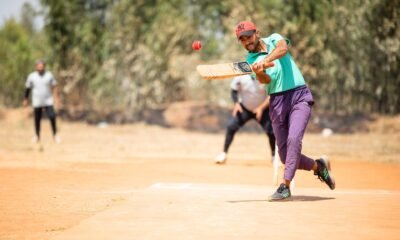Sound Plunge
The Trouble of Being a Pakistani Artist: Farhan Saeed Butt
The euphoric audience response towards the inimitable vocal introduction of the Jal classic, Woh Lamhey, at a Delhi performance, is testimony to the singer’s long endured popularity. Almost a decade ago, audiences in India and Pakistan were introduced to the distinct sound of Lahore- based, pop-rock outfit Jal. Today, vocalist Farhaan Saeed Butt, instrumental in the band’s success, has embarked upon a solo career. soundplunge_test shines the spotlight upon Farhaan as we quiz him about his perception of the independent music scenario in the subcontinent and what it means to be an artist in the politically unstable Pakistan.
soundplunge_test: You are a veteran of the Pakistani music industry. Tell us a little bit about the independent industry, in your country, as it stands today?
Farhan Saeed Butt: It has unfortunately seen a downward slide. When we started around 2004, the likes of Junoon and Strings, had established the scene. We came in and reaped the rewards for all their hardwork . Jal arrived at the peak of the independent music industry. We were playing numerous gigs, channels were playing our music. It was phenomenal.
Unfortunately, a period followed where security concerns in Pakistan took precedence over everything else. Entertainment invariably slipped onto the backseat. Furthermore, the ban on Youtube adversely affected musicians. We were losing out on a fantastic medium through which we could share our music. The ban issue was so sensitive, that it couldn’t really be spoken about. That set back the music industry.
ST: Keeping in mind the existing issues, do artists within the subcontinent view the Indian market as the most commercially viable?
FSB: Undoubtedly, India is a massive market. Artists from Pakistan have seen tremendous, commercial success here. But it is also the toughest sector to break into. You have to produce quality music. Junoon, Noori, Strings, Mekaal Hasan, all stalwarts of independent music in Pakistan have massive popularity in India.
But, I think within the next 5 years Pakistan will see a huge surge in the kind of music it produces. We need to commend the entire music industry for keeping the independent scene alive. Inspite of the obstacles, new music and bands emerge every day. The quality is impressive, but there is a lack of exposure. That will change.
ST: Is exposure an issue that plagues South Asian bands, beyond the subcontinent?
FSB: Jal was fortunate enough to go international. We have performed at concerts all around the globe. But, language did act as a barrier for an all-out crossover. Our audiences abroad consisted primarily of a hindi / urdu speaking crowd. As a musician, I can enjoy a two hour show where I do not understand the lyrics, but for a mass audience to accept music where the lyrics are alien to them is difficult.
Let me give you an example. Bangladesh has some amazing bands. Infact, even Kolkata, has some very impressive bands with great music, singing in Bengali. I have performed in Kolkata too, and I think people there really know their music. Even children have a sense of tempo. But we don’t see a lot of Bengali bands touring India or bands from Bangladesh traveling to India or Pakistan or Sri Lanka. It is because there is a language barrier.
ST: As an artist, how would you seek to promote music from the region in foreign shores?
FSB: To have a global appeal while singing in Hindi or Urdu or Bengali might be difficult. You are expecting an international audience to relate to you through a two hour concert. The flipside lies in the fact that if I try and sing in English, I don’t attain my maximum potential as a singer or the music I create. Collaboration with an international artist is an option. Or we highlight aspects of our music which are unique. Nusrat Fateh Ali Khan’s ‘sargams’ would drive foreigners absolutely crazy.
Also, I do an ‘alaap’ before certain songs and often they become the USP of that song and what the people recognise the song for. There will be a one off case like a Gangnam Style which will have mass appeal across language barriers. But personally, I think collaborations with international artists would be the best way to increase our presence everywhere while creating quality music. The more collaborations the better. I would still sing in our language but maybe fuse it with someone singing in English.
ST: Why do think we see so many Hindi/Urdu bands emerge from Pakistan with an alternative rock sound? It’s a sound we associate with English bands in India.
FSB: I think it’s a result of the kind of music we have been playing and listening to for years. In India, Bollywood is massive, so I guess if you are performing in Hindi your sound will have some similarities to the industry.
I think India in the next few years will see a massive opening for non- Bollywood hindi music. Not only for bands but music within the film industry too. For example, movies like Rockstar and Rock On, are prime examples of that shift happening. I have performed in college campuses here and I think the young audience is very receptive of non- filmy music. This is the time for independent artists. The audience wants them. The internet is their biggest tool to reach out to more and more people and it can only grow bigger.
The best thing that could have happened for independent music in the subcontinent is the exchange of musicians between the two countries. We hope to bring a certain sound into your industry and I think Bollywood is the best medium to actually ensure Hindi music goes global. It is a powerful tool.
ST: On a personal note, what are your ambitions as a solo musician?
FSB: Firstly, parting ways with a successful band like Jal was a bold step. Fortunately, things have worked out well for. The singles I have released including Halka Halka Suroor and Pee Jaoon have done well and now an album is in the offing. As a career path, I want to be associated with the Indian film industry. Lend my voice to songs as well as lend my songs to films.
Being associated with a huge market like Bollywood also provides your music with an unprecedented push and consequently brings your non-film work into the spotlight too. I definitely don’t want to lose my solo identity.
ST: Quick questions:
FSB: If not a musician, what would Farhaan be? – Cricketer
Favorite Indian artist? – Jagjit Singh
Woh Lamhey or Aadat? – Aadat









































Pingback: Manahil Malik Video self leaked says Pakistani Actress Mishi Khan